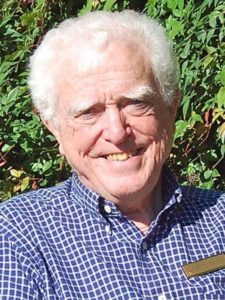
Some voices linger like echoes in the chambers of the church. We hear them again and again, sometimes with greater clarity than we heard at first. The voice of Loren Mead continues to echo among us who care about the mission of congregations and seek to be people of faith in the world.
This week, as I learned of the passing of Loren Mead, founder in 1974 of the Alban Institute, I heard his distinctive Southern voice as I heard it in conversations, at conferences, and at the few workshops I co-led with him. What was most distinctive about Loren Mead was what he had to say—in the 1990s when few were saying it—and what he still has to say to us now.
Several of us in the Congregational Consulting Group worked as consultants together at the Alban Institute. Whether Loren Mead was president or not when we were “at Alban,” we continually felt the influence of his work as it showed up in our own. A portrait of him hung on the wall at the Alban offices, and I remember thinking, “He is watching us.”
Loren Mead wrote numerous books about the church, of which perhaps the best read were collected in the 2001 trilogy, The Once and Future Church Collection. In these books, Mead grappled with tensions between the church as it is and the church that wants to be. In an interview with David Lott reflecting on his consulting work, Mead said:
When I work with a congregation, my client is two congregations—one is that one there that I’ve got to work with; I’ve got to keep them working and feeling like they’re getting toward what they need. But the other client is that congregation as God is calling it to be.
We all know too clearly the congregation that is “there that I’ve got to work with.” We also have glimmers of that congregation’s aspirations, and sometimes we even get an inkling of “that congregation as God is calling it to be.” Sometimes that creative tension pushes congregations to imagine and push into the future. At other times, the tension feels insurmountable, like a chasm neither faith nor skill can find a way to cross.
Not Just the Congregation, but “the Church”
Though he believed and wrote that “The real church is the local church,” Mead also spoke of the church more globally, and especially of the shifts in the relationship of Christianity to culture. In Once and Future Church, Mead described three “paradigms” or “ages” of the church: the Apostolic Paradigm of the persecuted early church, the Christendom Paradigm of the institutional church embedded in the Roman Empire after Constantine. The church of postwar America was in some ways even more allied with the culture. But with the loss of “cultural establishment,” the church often finds ourselves today surrounded by benign indifference. Mead pointed toward a “third way of being church” he hoped would emerge in response to the new environment.
We can see some hints of that “third way of being church” even now, though church reform often amounts to little more than listening to new styles of music or using new technology for worship or collecting money. Loren Mead’s perspectives still can help us transform surface changes into new ways for the church to transform lives—or in Mead’s words, to “prepare disciples and apostles.”
Five Challenges for Churches
Mead’s “Five Challenges” for moving toward the Future Church are still relevant for us now:
- To transfer the ownership of the church (allowing laypeople to fulfill their ministries in the world and the church and helping clergy to be catalysts for this)
- To find new structures to carry our faith (transforming denominational, financial, ecumenical, and interfaith relationships to build trust)
- To discover a passionate spirituality (shifting from knowledge to experience of God)
- To feed the world’s need for community (feeding the hunger left by the loss of traditional modes of social connection)
- To become an “apostolic people” (engaged with freedom and liberation movements, caring for the creation, and bringing ministry into the world and into people’s lives)
Mead’s words still challenge congregations that look in the rear-view mirror at their glory days instead of forward to what lies in front of them. As a consultant, I often experience congregations like this. Yet, even the fact that they have called in a consultant means that they have some desire and hope to connect their past, present and future in some new way. I recall Mead’s words: “that one there that I’ve got to work with.”
I was formed early on my church consulting career by the work of Loren Mead. His work offered me perspectives and practices for engaging the creative tension between the church that was and the church that possibly might be. I am grateful for his life and his work.
Reflecting on the challenges that churches faced Mead asked, “I wonder if we still have the time.” This is still an open question. Working with a congregation recently, I asked them to begin each sentence with the phrase, “Moving forward…” We then sang the Spiritual, “You know we’ve come this far by faith… No turning around.”
We don’t know what kind of future God has in mind—or in store—for the church. But the church can only benefit from having had Loren Mead’s clear-eyed appraisal of what once worked and his challenge to see what might work now and in the future.
[box]Lawrence Peers partners with religious organizations and leaders across many faith traditions to help them lead from a sense of purpose and innovate by aligning strategy and spirit. He draws from a rich array of methodologies as he facilitates whole systems, participatory strategic planning, staff team coaching, clergy coaching, and retreats. Larry joins the Congregational Consulting Group and some of his former consultant colleagues from the Alban Institute after four years of being a director of the Pastoral Excellence Network.[/box]
